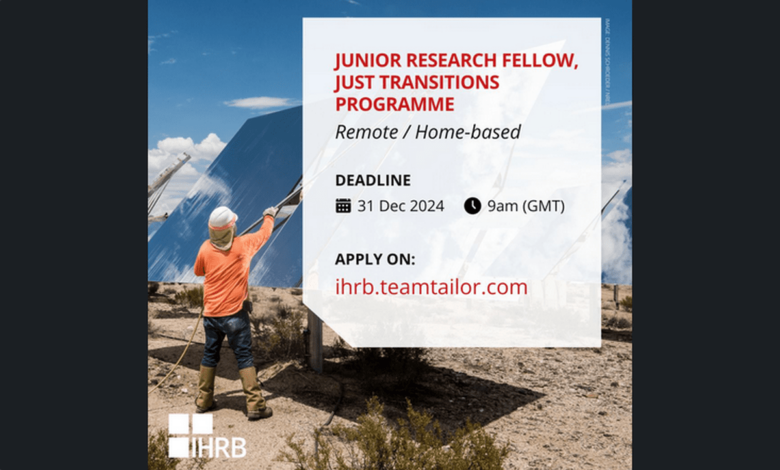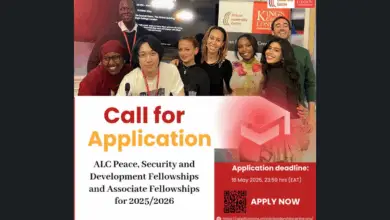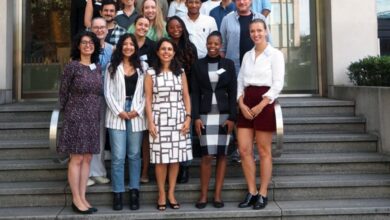The Institute for Human Rights and Business is looking for a fully remote Junior Research Fellow to join their team (£1,725 per month)

Closing Date: 31 December 2024
The Institute for Human Rights and Business is looking for a fully remote Junior Research Fellow to join their team (£1,725 per month)
Overview
The Institute for Human Rights and Business (IHRB) is seeking a dynamic junior researcher for a six-month fixed term paid work experience programme to support its Just Transitions projects.
The Just Transitions Junior Research Fellow will play a critical role in supporting the Programme’s multi-year policy-influencing, and ecosystem-building research projects. The Junior Research Fellow will support with administrative and research tasks across the Programme’s diverse projects, requiring a candidate with strong research skills, attention to detail, ability to multitask, and to work autonomously in a fully remote work environment. The ideal candidate is passionate about advancing human rights and climate justice, with a demonstrable willingness to learn, adaptability, and an entrepreneurial approach to problem solving.
About the Organisation
IHRB was founded in 2009. Its vision is to achieve a more just, regenerative global economy where:
- Workers and communities are free and able to use their voices effectively to ensure their rights are respected.
- Businesses demonstrate respect for the rights of workers and communities, and the natural systems they depend on, in their purpose, operations, relationships, and value creation.
- Financial actors use their leverage to positively impact the scale and performance of their partners’ human rights and environmental responsibilities.
- Governments actively implement a smart mix of long-term incentives and disincentives that drive rights-respecting and planet-aligned business.
About the Just Transition Programme
The Just Transitions Programme seeks to contribute to a wider understanding of just transitions through research and testing effective approaches for companies and governments to integrate the voices and concerns of those impacted by climate-related policy and action at every level. IHRB foundational report, Just Transitions for All: Business, Human Rights and Climate Action, set out the benefits of approaches that considers all the salient rights of workers, communities, and consumers affected by transitions, as well as those facing the impacts of climate change. IHRB’s four essential elements for safeguarding the “just” in just transition offer further context and guidance for how to combat the confusion and risk of co-option that is growing as the concept gains popularity.
IHRB’s research fellowship offers a 6-month placement suitable for incoming professionals, applicants who might be returning to work, or transitioning into a new field. This initiative aims to create a pathway for individuals to gain experience while actively contributing to IHRB’s mission.
In particular, the Just Transitions Junior Researcher will support the Just Transitions Programme team to implement a number of multi-year policy-influencing, and ecosystem-building research projects, including, but not limited to:
- The Cost of Green Conflict:The growth of renewable energy around the world is bringing with it significant distress, disruption, and dissent from indigenous groups, communities, and workers. This two-year project will seek to evidence and quantify the operational, reputational, and opportunity costs to renewable energy companies across a mix of green technologies when they fail to secure or maintain their social licence to operate.
- Just Stories: Narratives illustrating the benefits of meaningful engagement between public and private enterprises and workers, communities, and indigenous groups are rare to non-existent within the net-zero agenda. The JUST Stories project will highlight change-makers – from transitioning institutions and the frontline groups most affected – who are finding ways of doing things differently, working in meaningful partnership to navigate the social, environmental, and economic trade-offs involved in the race to net-zero.
- Just Energy Transition Partnerships (JETP): Just Energy Transition Partnerships are fast becoming a go-to model for catalysing national-level decarbonisation initiatives. They represent the nexus of the financing and social imperatives at the heart of achieving net-zero. IHRB work on JETPs analyses the human rights risks and social opportunities associated with private sector involvement in JETP. IHRB recently completed a pilot study in South Africa, the first JETP country and most advanced in terms of implementation and planning. IHRB aim to expand work to other JETP countries in 2025, starting with Indonesia, and then Senegal.
What You Will Do
Reporting to the Just Transitions Programme Manager, and working closely with the Head of Just Transitions and wider Just Transitions project teams, the Just Transitions Junior Researcher will support the full suite of programme functions, including but not limited to:
- Desk research & literature review: Supporting desk review of sustainability science and policy literature on a range of questions related to responsible corporate climate action. For example, the research related to renewables company involvement in local conflict at project sites; examples of meaningful engagement within decarbonisation initiatives across a diversity of sectors and geographies; how various JETP countries are shaping the role of business in key policy instruments; specific financial instruments aligned with just transition principles.
- Stakeholder mapping & supporting interviews: Supporting lead researchers with mapping key stakeholders and transcribing a series of in-depth and confidential interviews with corporate, finance, legal, and sustainability professionals across a range of sectors, in particular renewable energy for the Cost of Green Conflict project.
- Project communications: Supporting the team with developing the Just Transitions Newsletter
Alongside the tasks outlined above, the Just Transitions Junior Researcher will be invited to attend internal management meetings where appropriate, gaining insights on pertinent business and human rights issues as well as valuable mentoring and networking opportunities with IHRB staff and partners.
Timeframe & Contracting
- Expected start date: 3 February 2025 (ideally)
- Hours: Full-time (5 days, 37.5 hours per week) or willing to consider part-time (4 days/ 30 hours) for the right candidate
- Duration: 6 months (fixed term)
- Location:Remote/Home-based. Location flexible within 3-4 hours of GMT timezone. Candidates must already have permission to work in the country of their location, must possess their own laptop and have access to good internet connectivity.
- Pay: £1,725 per month (based on full-time, 37.5 hours per week). Equivalent of £20,700 per annum, pro-rata. IHRB’s compensation is calculated based on a London, UK benchmark.
- Contracting: The successful candidate will be engaged through a consultancy agreement. They will need to be registered as self-employed and will be responsible for managing their own taxes, insurance, and any other legal or financial obligations.
Requirements
Experience & Knowledge:
- Minimum 2 – 3 years of work experience.
- Open to candidates of all ages, including applicants who might be returning to work or transitioning to a new field.
- Have a strong interest to work in human rights, climate action, and social justice issues.
- Proven research and writing experience, preferably with a demonstrable focus on human rights, climate, or development economics.
Skills & Abilities:
- Proven data and quantitative analysis skills, including proficient use of Google Sheets
- Ability to write and present clear, well researched, solutions-oriented analysis and recommendations into digestible internal briefings.
- High capacity to organise and manage multiple priorities within a fully remote team, demonstrating willingness to learn, adaptability, and a entrepreneurial approach to problem solving.
- Collaborative working style and strong team player.
- Ability to read, write, speak, and understand English required. Additional language skills are desirable but not essential.
- Ability to undertake work with awareness of political and commercial sensitivities and careful diplomacy.
Click Here To Apply
Follow Opportunities For Everyone on Social Media




